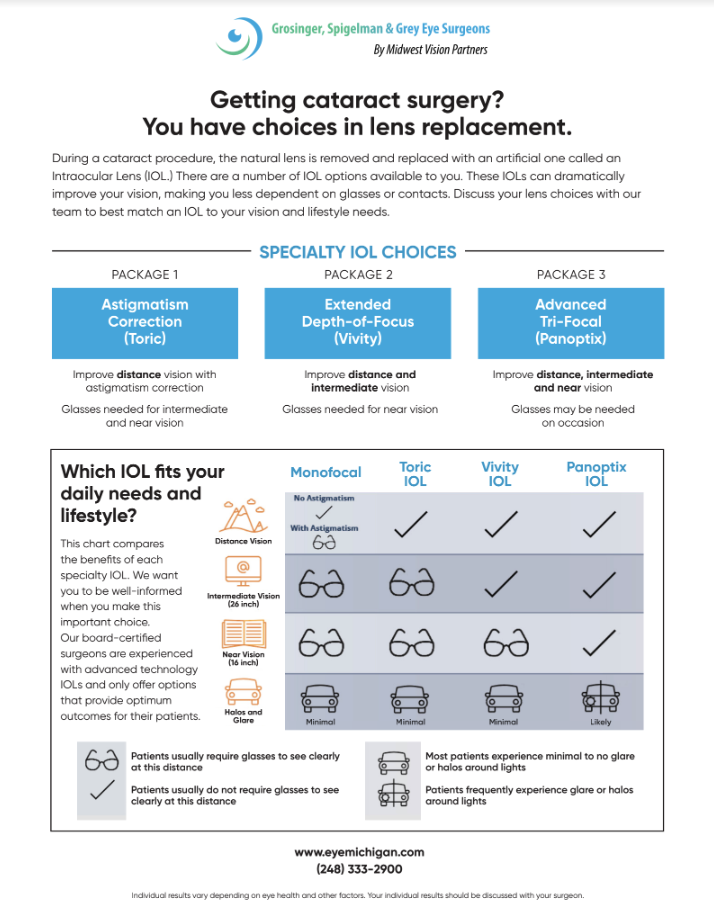- What is a cataract?
- What are the benefits of cataract surgery?
- How is cataract surgery performed?
- What lens options are available to me?
- What location will my cataract surgery be performed at?
What is a cataract?
Our eye is much like a camera. In order to see quality images, all parts must be functioning properly and light must have the ability to pass through the lenses without obstruction.
Cataracts are the result of protein inside of the lens breaking down, clumping together and clouding over the natural lens. This clouding causes an obstruction in the amount of light that can reach retina, affecting how your brain can perceive images.
Cataracts usually develop as a normal part of the aging process. In rare circumstances, they may also develop following eye trauma or the use of certain medications. A small amount of cataract development may not cause a noticeable change in vision but, as time progresses, the cataract will continue to become larger and cause distorted vision.
Updating glasses or contacts may improve vision temporarily, but the only effective treatment for cataracts is surgical removal.
Cataracts may cause:
- Cloudy or blurred vision
- Dull vision or fading color vision
- Glare or light sensitivity
- Difficulty seeing or driving at night
- Double vision or depth perception problems.
What are the benefits of cataract surgery?
Cataract surgery is a common procedure with excellent surgical outcomes. The most obvious benefit of cataract surgery is improved vision but, it may also contribute to an improved quality of life, greater independence, and improved mental health.
Improved vision can improve your quality of life
- Alleviate difficulty when reading small print found on labels or in books
- Enjoy clearer, crisper vision while watching television or sporting events
- Resume hobbies and crafts
Potential to increase or regain your independence
- Regain confidence in your ability to drive a vehicle with improved vision
- Navigate your home safely and reduce risk of fall or injury
- Improved enjoyment when participating in social activities or viewing outdoor scenery
Vision Correction
Take the self-evaluation to determine if you’re eligible
How is cataract surgery performed?
At our eye surgery center, we offer no-stitch, small incision cataract surgery. This advanced procedure holds several benefits over conventional forms of cataract surgery.
With the no-stitch procedure, patients experience:
- Less discomfort
- Recover more quickly
- Achieve improved vision more rapidly
- Reduced incidences of surgically induced astigmatism, in comparison to other forms of cataract surgery.
Cataract surgery is an out-patient procedure and typically only requires the use twilight sedation or “IV sedation”. Twilight sedation allows patients to experience a state of drowsy relaxation, can help reduce anxiety and allows for faster recovery.
Your surgeon will apply a local anesthetic to the eye to ensure a painless procedure. A tiny, self-sealing incision is then made in the sclera (the white portion of the eye). The clouded lens is dissolved using a device that emits ultrasonic waves. It is then carefully removed and replaced by a foldable intraocular lens or an IOL. The new lens will restore the function of a healthy, natural lens. The entire procedure lasts approximately 15 minutes.
What lens options are available to me?
Innovative technology and advancements in intraocular lenses have improved both visual outcomes and reduced or eliminated the need for glasses or contacts following cataract surgery.
Intraocular lenses or IOLs are medical devices that are inserted into the eye following the removal of the natural lens. These devices may eliminate dependence on corrective glasses or contacts by providing the corrective power necessary to focus light rays on the retina.
Monofocal IOL’s provide basic vision correction for one focusing distance. Selecting a monofocal IOL will allow for clear distance vision, but patients will still need reading glasses or bifocals to see up close. Depending on occupation or history of farsightedness, patients may also choose to see clearly up close, requiring corrective lenses to see distant objects.
Toric IOL’s can simultaneously replace the clouded lens of the eye and provide correction for astigmatism. Astigmatism is a common irregularity in the curvature of the cornea that causes blurry, distorted vision. Toric lens implants contain the astigmatic correction necessary to focus light onto the retina and give superior clarity. Similar to the monofocal IOL, a Toric IOL can offer clear vision at one focusing distance. You and your physician will determine which focusing distance would be appropriate for your lifestyle.
Multifocal IOL’s restore much of our visual function, allow for the least dependence on glasses or bifocals, and offer the greatest patient satisfaction. Multifocal intraocular lenses have varying optical designs and target several focal points allowing patients to achieve their best vision, ranging from near to far. Select multifocal IOL’s can even treat your astigmatism. You and your surgeon will determine which multifocal lens implant would best suite your lifestyle needs.
Learn more about Premium Cataract Lens Options
What location will my cataract surgery be performed at?
Cataract surgeries are performed at the Eye Surgery Center of Michigan located in Troy, Michigan. Our state-of-the-art surgical center provides a relaxed, patient-focused environment offering fully-equipped operating rooms, the latest surgical technologies, and specially-trained, experienced staff. Out-patient surgery is available to most patients and usually allows them to be discharged within 30 minutes after surgery to recuperate in the comfort of their own home.
Eye Surgery Center of Michigan Contact Information
Hours: Monday through Friday 6:00AM – 4:00PM
Address: 3455 Livernois, Troy, MI 48083
Phone: 248-619-2020
Fax: 248-619-7150
At Grosinger, Spigelman & Grey, our ophthalmologists have extensive experience in the diagnosis and treatment of cataracts. We provide the latest techniques in cataract surgery, including the no-stitch, small incision procedure. Residents of Bloomfield Hills and the surrounding communities who are looking for an experienced cataract surgeon can rely on the expertise of our accomplished doctors.


